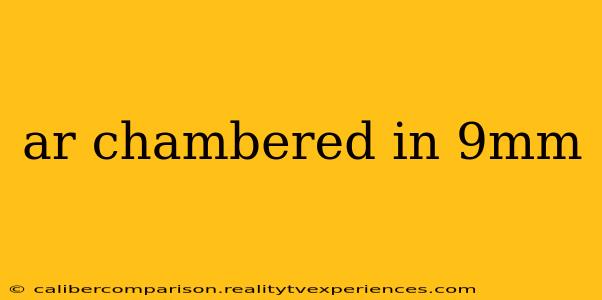The AR-15 platform, long a staple in the world of firearms, has seen a significant expansion beyond its traditional .223 Remington/5.56 NATO chambering. One of the most popular alternative calibers is 9mm, offering a compelling blend of affordability, versatility, and stopping power. This guide delves into the nuances of AR pistols and rifles chambered in 9mm, exploring their advantages, disadvantages, and overall suitability for various applications.
Why Choose a 9mm AR?
The appeal of a 9mm AR stems from several key factors:
-
Ammunition Cost: 9mm ammunition is considerably cheaper than .223/5.56, allowing for more extensive practice and training. This is a significant advantage for budget-conscious shooters.
-
Recoil Management: The lower recoil of 9mm compared to .223/5.56 makes it easier to control, especially for new shooters or those with less upper body strength. This translates to faster follow-up shots and improved accuracy.
-
Stopping Power: While not as potent as some larger calibers, 9mm offers sufficient stopping power for self-defense and home protection scenarios. The wider variety of ammunition types, including hollow points and expanding rounds, further enhances this capability.
-
Versatility: 9mm ARs can be configured in various styles, from compact pistols ideal for concealed carry to full-sized carbines suitable for home defense or recreational shooting.
Understanding the Mechanics: Blowback vs. Delayed Blowback
Most 9mm ARs utilize either a blowback or a delayed blowback operating system. Understanding these differences is crucial:
-
Blowback Systems: These are simpler and generally more reliable, utilizing the force of the recoiling cartridge to cycle the action. However, they can be less accurate at higher rates of fire due to increased recoil impulse.
-
Delayed Blowback Systems: These systems incorporate mechanisms to delay the unlocking of the bolt, reducing the impact of recoil and often resulting in improved accuracy. While more complex, they offer enhanced control and performance.
Advantages and Disadvantages of 9mm ARs
Advantages:
- Cost-effective ammunition
- Reduced recoil
- Suitable for various applications
- Wide range of configurations available
- Increased capacity compared to standard AR magazines
Disadvantages:
- Potentially lower muzzle velocity than .223/5.56
- Can be heavier than comparable .223/5.56 ARs
- May require specific magazines not compatible with standard AR magazines
- More prone to malfunctions in extremely dirty conditions (depending on the design)
Choosing the Right 9mm AR: Factors to Consider
When selecting a 9mm AR, consider the following:
-
Intended Use: Home defense, concealed carry, or recreational shooting will influence your choice of platform (pistol vs. carbine) and features.
-
Budget: Prices can vary significantly depending on the manufacturer, features, and overall quality.
-
Operating System: Blowback systems are typically more affordable and reliable, while delayed blowback systems offer enhanced accuracy and control.
-
Manufacturer Reputation: Choose a reputable manufacturer with a proven track record of producing high-quality firearms.
Conclusion
9mm ARs offer a compelling alternative to traditional .223/5.56 ARs, particularly for those prioritizing affordability, manageable recoil, and versatility. By understanding the nuances of different operating systems and carefully considering your individual needs, you can choose a 9mm AR perfectly suited to your specific applications. Remember to always prioritize safety and handle firearms responsibly. This information is for educational purposes only, and you should consult relevant legal authorities and firearm safety experts before purchasing or handling any firearm.

